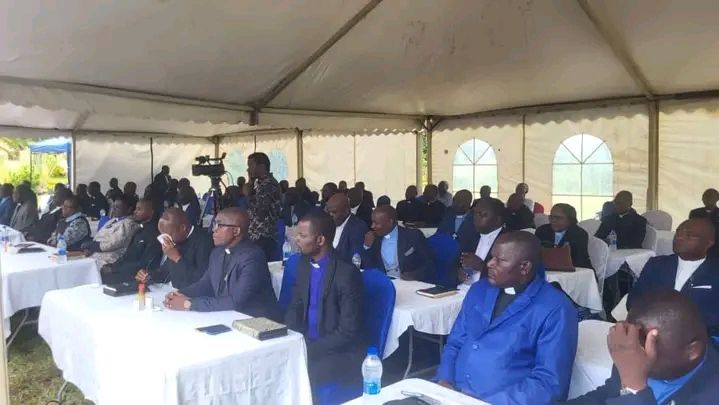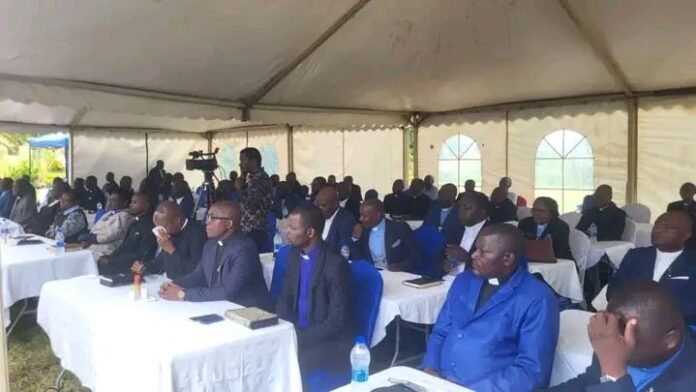By Jones Gadama
The recent decision by the Blantyre Synod of the Church of Central Africa Presbyterian (CCAP) to summon clerics for conducting prayers at the residence of former President Peter Mutharika raises significant questions about the synod’s priorities, its understanding of pastoral care, and its commitment to the principles of Christian fellowship. This critique seeks to analyze the implications of this action, arguing that the synod’s response is not only misguided but also detrimental to the church’s mission and its relationship with its members.
At the heart of the issue is the fundamental role of the church in the lives of its members. The CCAP, like any other Christian denomination, is called to provide spiritual support, guidance, and prayer for all its members, regardless of their political affiliations or past actions. Peter Mutharika, as a member of the CCAP, is entitled to the same pastoral care as any other congregant. The clerics who prayed at his residence were fulfilling their duty as spiritual leaders, offering prayers for a fellow believer in a time of need. This act of compassion and support should be celebrated rather than condemned. By summoning these clerics, the Blantyre Synod appears to prioritize political correctness over the core tenets of Christian love and fellowship.

The synod’s decision to distance itself from the sentiments expressed by the clerics further complicates the situation. In doing so, the synod not only undermines the authority of its own ministers but also sends a troubling message to the congregation. It suggests that the church is willing to sacrifice its pastoral responsibilities in favor of maintaining a certain political stance or public image. This is particularly concerning in a country like Malawi, where political divisions can often overshadow the need for unity and support within the church. The clerics acted out of a sense of duty to their member, and the synod’s response indicates a lack of understanding of the pastoral role that clergy are called to fulfill.
Moreover, the Blantyre Synod’s actions reflect a broader trend within religious institutions to align themselves with specific political ideologies, often at the expense of their spiritual mission. This politicization of the church can lead to a fragmentation of the congregation, as members may feel alienated or unwelcome based on their political beliefs. The church should be a place of refuge and support, where individuals can come together in faith, regardless of their political affiliations. By summoning the clerics, the synod risks creating an environment where members feel they must choose between their faith and their political beliefs, which is antithetical to the inclusive nature of Christianity.
The synod’s stance also raises questions about the nature of accountability within the church. While it is essential for church leaders to be held accountable for their actions, this accountability should not come at the expense of compassion and understanding. The clerics who prayed for Mutharika were not engaging in political endorsement; they were performing a spiritual duty. The synod’s decision to summon them suggests a punitive approach to accountability, one that prioritizes adherence to a specific political narrative over the well-being of its members. This approach can create a culture of fear among clergy, where they may hesitate to offer support to members in need for fear of repercussions from the synod.
Furthermore, the Blantyre Synod’s actions can be seen as a failure to recognize the complexities of the political landscape in Malawi. The country has a history of political turmoil, and many individuals, including those in positions of power, are in need of prayer and support. The church’s role is to provide that support, helping individuals navigate their challenges with faith and guidance. By summoning the clerics, the synod is effectively saying that only certain members are worthy of prayer, which is a dangerous precedent. It suggests that the church is willing to pick and choose who deserves spiritual support based on their political standing, which is not only un-Christian but also deeply divisive.
In addition, the synod’s response can be interpreted as a lack of trust in its clergy. By summoning the clerics and publicly distancing itself from their actions, the synod implies that it does not believe its ministers are capable of making sound decisions regarding pastoral care. This lack of trust can have a chilling effect on the clergy, discouraging them from engaging with their congregations in meaningful ways. It can also lead to a sense of disillusionment among clergy members, who may feel unsupported by their leadership. This disconnection can ultimately harm the church’s mission, as clergy may become less effective in their roles if they feel they are not backed by their synod.
The Blantyre Synod’s actions also raise concerns about the message being sent to the wider community. In a time when many people are searching for hope and guidance, the church should be a beacon of light, offering support and encouragement to all. By summoning clerics for praying with a fellow member, the synod risks alienating not only its own members but also the broader community. It sends a message that the church is more concerned with political optics than with the spiritual well-being of its congregants. This can lead to a loss of credibility and relevance in a society that is increasingly looking for authentic expressions of faith.
Moreover, the synod’s decision to distance itself from the clerics’ actions can be seen as a failure to engage in meaningful dialogue about the role of the church in politics. The church has a responsibility to speak out on issues of justice, morality, and ethics, and this includes engaging with political leaders and offering them spiritual support. By summoning the clerics, the synod is effectively shutting down any potential for constructive engagement with political leaders, which is a missed opportunity for the church to influence positive change in society. The church should be a voice for the voiceless, advocating for justice and righteousness, and this includes offering prayer and support to those in positions of power.
In conclusion, the Blantyre Synod’s decision to summon clerics for conducting prayers at Peter Mutharika’s residence is a troubling reflection of the church’s priorities and understanding of its mission. By prioritizing political correctness over pastoral care, the synod risks alienating its members and undermining the very principles of Christian fellowship. The church should be a place of support and compassion, where all members, regardless of their political affiliations, can receive spiritual guidance. The synod’s actions not only fail to recognize the complexities of the political landscape but also send a damaging message about the church’s role in society. It is essential for the church to reclaim its mission of love, support, and unity, rather than allowing political divisions to dictate its actions.
The clerics who prayed for Mutharika were acting in accordance with their pastoral duties, and the synod should have embraced this act of compassion rather than summoning them for it.
The church must strive to be a place of refuge and support for all, embodying the love and grace that is at the heart of the Christian faith.



